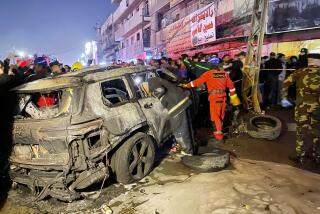Militants used vehicle bombs to rout Iraqi forces in Ramadi, U.S. says
Islamic State suicide bombers routed Iraqi forces in a key provincial capital on Sunday after using heavy vehicles packed with enough explosives to level city blocks, a senior State Department official said Wednesday.
The militants used an explosives-laden bulldozer to punch a hole in tall concrete security barriers protecting the government center in central Ramadi, the official said.
They followed up by setting off a bomb-rigged dump truck and an armored Humvee near the same location, causing massive blasts.
As many as 30 such vehicle bombs created a wave of “horrific, gigantic explosions that took out entire city blocks,” the official told reporters Wednesday. He declined to be identified, citing ground rules often invoked by State Department officials.
The blasts inflicted a crushing psychological blow on Iraqi security forces, who abandoned tanks and other heavy equipment as they fled the city, ending a battle for control that has raged for 18 months.
The fall of Ramadi, about 60 miles west of Baghdad, has raised questions about the adequacy of the combined U.S.-Iraqi strategy for battling Islamic State, which is also known as ISIS or ISIL.
Critics in the United States contend the loss is more proof that the Obama administration’s reliance on airstrikes over ground assaults won’t be enough to dislodge the Sunni extremist group from its self-declared caliphate in Iraq and Syria.
The militants’ effective use of vehicle-borne improvised explosive devices to penetrate government defenses and shock its troops has become a focus of U.S. officials’ analysis of what went wrong in Ramadi, the official said.
During his last visit to Washington, Iraqi Prime Minister Haider Abadi asked for antitank weapons to enable Iraqi troops to deal with suspected vehicle bombs before they can be set off.
U.S. officials agreed to the request and are planning to deliver 1,000 AT-4 antitank weapons to Baghdad by early June.
The official said U.S. and Iraqi officials are trying to diagnose what went wrong and to plan a counterattack to retake Ramadi, the capital of Anbar province, Iraq’s Sunni heartland. But he acknowledged that planning the response “is going to take some time.”
U.S. officials plan to step up deliveries of weapons that Iraq’s government has requested.
The official insisted that the Iraqi military units did not disintegrate, as happened after Islamic State seized the city of Mosul last year. Instead, he said, Iraqi troops fell back to defensive points and now are regrouping and trying to regain their strength.
He played down concerns that the defeat would draw Iranian-backed Shiite Muslim militias into the battle, sharpening sectarian tensions. He said the Abadi government continues to command the anti-Islamic State forces and is committed to working with the Sunni and Kurdish communities.
Although White House officials cautioned this week against overreacting to the Ramadi defeat, the State Department official called it a “very significant setback.”
He described Islamic State as an unprecedented terrorist threat to the region and the wider world.
“We’ve never seen a terrorist organization with 22,000 fighters from 100 countries,” he said.
That is about twice the size of the guerrilla groups, some backed by the CIA, that forced the Soviet Union to quit Afghanistan in 1989 after a nine-year conflict, he noted.
For foreign policy news, follow me at @richtpau
More to Read
Start your day right
Sign up for Essential California for news, features and recommendations from the L.A. Times and beyond in your inbox six days a week.
You may occasionally receive promotional content from the Los Angeles Times.







